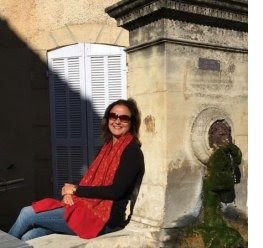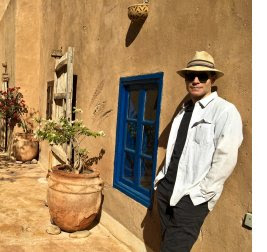Sapling is a curated weekly e-newsletter from Black Lawrence Press highlighting the best of the small press world. In their August 2018 issue, Sapling interviewed Cagibi co-founders Sylvie Bertrand and Christopher X. Shade.
Sapling: What should people know who may not be familiar with Cagibi?
Cagibi: Cagibi is invested in sharing the universal human experiences to be found in works of prose and poetry set within places unfamiliar to readers; thus, our expressed interest in international—or world—literature, and works in translation. We welcome non-traditional and emerging writers, as well as minority and marginalized viewpoints. The journal is bundled online in quarterly issues, with one print issue each year. Each issue publishes stories, essays, poetry, and art, as well as extra features including writers in conversation, essays on the writing craft and reading, experimental narratives told through visual art, and excerpts from forthcoming books–some of these features can also be found on Cagibi Express, the online space we created to publish more timely material between our regular issues.
Sapling: How did your name come about?
 Sylvie Bertrand: A cagibi, in French, has many meanings: it’s a space made out of an unused corner, it’s a cabinet, a cubbyhole, a shed, a place where one stores all kind of strange, unusual, meaningful, forgotten stuff. We wanted a word that reflects our editorial interest, which is this idea of place and space, both in the work we publish and in our mission to host retreats where writers can carve out a space for tooling, digging, raking—in other words, workshopping.
Sylvie Bertrand: A cagibi, in French, has many meanings: it’s a space made out of an unused corner, it’s a cabinet, a cubbyhole, a shed, a place where one stores all kind of strange, unusual, meaningful, forgotten stuff. We wanted a word that reflects our editorial interest, which is this idea of place and space, both in the work we publish and in our mission to host retreats where writers can carve out a space for tooling, digging, raking—in other words, workshopping.
“From the beginning, our only requirement for the name—and it was an absolute requirement, we agreed—was that it had to be a recognizable word, nothing French.” —Shade
Christopher X. Shade: It was so much fun to come up with a name. In the beginning. It was like a game. Which one of us could come up with the best name? We were texting name ideas to each other for the longest time. It grew more serious. There were competitive moments. Who had the best? The fun didn’t stop. Gradually it became less of a game, because it was real; we were really going to do this. From the beginning, our only requirement for the name—and it was an absolute requirement, we agreed—was that it had to be a recognizable word, nothing French. It had to be a word easy to pronounce. So, like so many things in life, we found ourselves in the opposite space! We were thrilled with cagibi. We both knew right away it was the one.
Sapling: What do you pay close attention to when reading submissions? Any deal breakers?
“In a short story, I am attracted to quirky personalities on the page that take me in unpredictable directions.” —Bertrand
SB: In poetry, if there is no rhythm or musicality, I’m out, I really need to “hear” poetry. In a short story, I am attracted to quirky personalities on the page that take me in unpredictable directions. I like to be challenged, to be forced to rethink the ways in which I apprehend the world. But overall, I want a narrative that engages me emotionally.
CS: I love cat stories. I love poetry about cats. And I love memoir pieces in which cats are present for important life-changing moments. I should also mention that I get super excited by work that helps me understand what it’s like to be a person living elsewhere, experiencing a place that’s unfamiliar to me, writing within which I discover emotional experiences that I and so many other readers can relate to.
Sapling: Where do you imagine Cagibi to be headed over the next couple years? What’s on the horizon?
SB: Big things! An established online presence open to prose, poetry, and visual art. A literary space that values community through close editorial work and ongoing conversations with our contributors. An annual print issue. Also, we will be hosting our first retreat this October, in the Hudson Valley, with workshop leaders Terri Muuss and Matt Pasca, who are terrific poets and teachers. And Nick Flynn and Beverly Donofrio will be there for a reading. We are planning more retreats. In fall 2019, South of France!
 CS: We actually thought no one would notice us. But we are being noticed, very much so! The number of people coming to read Cagibi is unbelievable. Our online issues are quarterly, we’re at Issue 3, and we’ve just launched a new section Cagibi Express which has cracked open a space between issues for conversations, essays, postcards, and interviews. More to come…!
CS: We actually thought no one would notice us. But we are being noticed, very much so! The number of people coming to read Cagibi is unbelievable. Our online issues are quarterly, we’re at Issue 3, and we’ve just launched a new section Cagibi Express which has cracked open a space between issues for conversations, essays, postcards, and interviews. More to come…!
Sapling: As an editor, what is the hardest part of your job? The best part?
SB: Not sure about the hardest part….although pressing that “Decline” button is never easy. The best part is helping a writer make a great story even better on the page.
CS: She’s right, the hardest part is declining work. It is an honor to be able to consider the work that writers share with us. We feel such gratitude that they do share with us. For me the best part is that we have come this far, that we are even in a position to be able to publish all that we do. Other hard parts are not editorial but about the business: we want to pay our contributors; we want our retreats to be more affordable for writers without degrading the retreat experience we envision; we want to offer retreat scholarships; for our readers, we want to innovate in publishing and distribution. These are only a few goals. We have a lot of these.
Sapling: If you were stranded on a desert island for a week with only three books which books would you want to have with you?
SB: The book I’m in the middle of reading now Eileen by Ottessa Moshfegh. The book I hope to read next: The Power by Naomi Alderman. And The Book of Luminous Things, a poetry anthology edited by Czeslaw Milosz, just in case I get stuck for more than one week!
CS: Elizabeth Bishop’s POEMS, which is everything — and because of her poem “The Fish.” Moby Dick, because of that fish. The third book is too difficult…I would grab as many slender books as I could possibly hold and hold them together and say it’s one book, it’s the third.
Sapling: Just for fun (because we like fun and the number three) if Cagibi was a person what three things would it be thinking about obsessively?
SB: What’s this place? How do I get there? And where can I find the best coffee?
CS: Sylvie and I think a lot alike (and also we don’t, which makes us a great team). I would say something very much the same thing if Cagibi was a person: what’s my next read, my next travel adventure, and my next pain au chocolat?
Browse Cagibi Issues
























